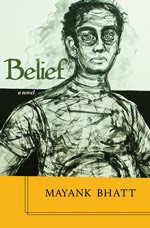 Jawaid Danish is cultural gadfly who believes in raising uncomfortable
questions through his plays and poems. He is also a filmmaker, having made a
critically acclaimed and successful film – Bara Shayer Chota Aadmi. As the artistic
director of Rangmanch Canada, Jawaid organizes an annual South Asian drama
festival where plays in different languages of the subcontinent are staged.
Jawaid Danish is cultural gadfly who believes in raising uncomfortable
questions through his plays and poems. He is also a filmmaker, having made a
critically acclaimed and successful film – Bara Shayer Chota Aadmi. As the artistic
director of Rangmanch Canada, Jawaid organizes an annual South Asian drama
festival where plays in different languages of the subcontinent are staged.  Author of 12 books of plays and poems, his works have been
translated into English, Swedish, Hindi, Bengali and Kannada. Last week, the
Writers’ Forum organized a book launch of Jawaid’s Chalees Baba Aik Chor (book
of plays) that deals with the pleasures and problems of Indian immigrants in
Canada.
Author of 12 books of plays and poems, his works have been
translated into English, Swedish, Hindi, Bengali and Kannada. Last week, the
Writers’ Forum organized a book launch of Jawaid’s Chalees Baba Aik Chor (book
of plays) that deals with the pleasures and problems of Indian immigrants in
Canada.The new book takes the journey forward. Two decades have passed, the immigrants are settled, bread and butter is not as pressing an issue as it was back then. But new issues have emerged, now the issues are psychological – issues such as divorces and single mothers. “And once these types of issues arise, every ones tries to become a BABA,” Jawaid says.
The book has seven plays. “The subjects I have selected are new and hardly ever discussed,” he adds. The plays are on AIDS ( Mukti), on divorce and arrange marriages (Jeewan Sathi Clinic), on mercy killing (Cancer) on Jewish and Palestinian problem (Nayee Shakh Zaitun Ki), transgender issues (Picky Baba Ka Chilla) and lastly on the sexual assault case of Nirbhaya of Delhi (Aik thi Roohi).
These plays have already proved to be a massive draw among the theatre-going public. The book is being translated in Hindi and Bengali.
“Both of my books of plays have been selected by Delhi University for research program; a student is doing M. Phil on them,” Jawaid adds.
This is a rare honour for any Indian writer settled in the West. It is for the first time that any diaspora plays have been selected for such a research program.
In a post-launch chat, Jawaid answered a few questions:
What inspires you to write?
Basically people, especially immigrants and their problems and pleasures inspires me to write.
Is writing dependent upon creative inspiration or is it a discipline that comes with practice?
Although writing needs some discipline, I am not disciplined as a writer. I write on inspiration. I write plays, it require a lot of patience and discipline. When I start a play, I continue to write from the start to the end. Sometime I create a character or change the character while I’m in the process of writing. Then, during rehearsals, I may completely change the climax, and make it a different play from what I plotted in the beginning.
For someone who is comfortable in both Hindi and Urdu, you occupy a unique position in contemporary South Asian literature in Canada. How do you see the literary scene in both languages in present-day Canada?
I am fortunate to know both Hindi and Urdu. I’m from Lucknow, and spent school days in Kolkata. I am comfortable in Urdu Hindi Bengali and English. I also know a little bit of Gujarati, Punjabi and Tamil. For a Nautanki guy, a theatre person, it’s helpful to know a vernacular language, and I also know the spirit of local variations to ethnic dialects (described in Urdu as Boli Tholi). I have command over many Indian dialects whether it is Tapori slang of Mumbai or the sophisticated seasoned Urdu of Lucknow.
As you know, there is a lot created here in the name of diaspora writings, in terms of poetry and fiction, but in the field of drama not much has happened, especially in terms of diaspora plays, dealing with the immigrants’ matters.
My Urdu my book Hijrat Ke Tamashey was published in 1990, since than no other Urdu or Hindi collection of plays has been published. This book went into three editions in Urdu, and then it was translated into Bengali, and was published in two editions with a third in the process. It has also been translated into Kannada and is being translated into English.
40 Baba Aik Chor came after some 24 years, but no book of plays has been published during that time in Urdu, Hindi or any other South Asian language except in English. I myself published 12 other book, travelogues and translations of world’s best revolutionary plays.
Briefly describe your best work...and why you consider it to be your best
My best work is Hijrat Ke Tamashey, plays of migrations. It’s a first of its kind, Prof. M. Hasan of JNU in Delhi says about the work, “First time, plays on immigrant pains and pleasures have surfaced in Urdu, Danish can write such experimental plays, as he himself is an immigrant and have firsthand experience of such problems.”
This book has gained much attention, recognition and awards, and finally Delhi University has conducted research work (M. Phil) on this collection of plays together with Chalees Baba Aik Chor.
A serial of 13 episodes was broadcasted on Omni T.V 2, in 2007 with several reruns on the plays of Hijrat Ke Tamashey, and I have produced a 100 minutes telefilm on one of its play Bara Shayer Chota Aadmi in 2013.
Photographs: Provided by Jawaid Danish




No comments:
Post a Comment